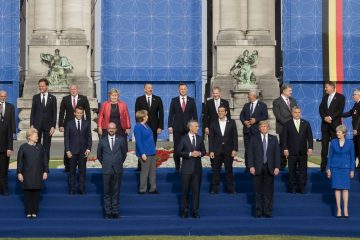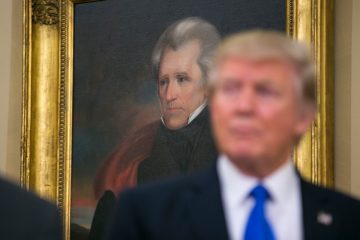
NATO, the Russian threat and defence spending
As expected, the recent NATO Summit was dominated by President Trump’s blunt criticisms of allies. He accused European member states of taking advantage of the United States, of failing to follow through on the 2014 agreement to raise defence spending to a minimum of 2% of GDP, and cozied up to Russia, perhaps most shockingly given the accusations levelled at his own campaign, of colluding with Russia. The basis for these accusations should be taken seriously, even if the latent threat of the United States withdrawing from NATO and the capricious means of delivery seem designed more to appeal to American domestic political interests than to truly illicit reform of the organisation. Cutting through the hyperbole, we see that there …

The Rightward Shift of U.S. Foreign Policy Didn’t Start with Trump
The recent confirmation of Mike Pompeo as Secretary of State by the Senate symbolizes that nationalist “hawks” dominate the Republican Party’s foreign policy. Even the famously non-interventionist Republican Senator Rand Paul supported his nomination. Pompeo’s quick and frictionless confirmation points to a shift to the right in what constitutes “common-sense” in US foreign policy. However, as this article will argue such changes in US foreign policy have predated Pompeo’s nomination and even President Trump’s election. Mike Pompeo, who came to Congress with the Tea Party movement in 2010, is an interventionist of the America-First variety. He desires strong sanctions on North Korea, Iran and Russia, supports extra-legal military strikes in areas of jihadist activity, and deeply distrusts China’s economic and …

Bizarre, strange or last straw? Slideshows in International Relations
Last week, Israeli Prime Minister Benjamin Netanyahu made headlines with his PowerPoint presentation on Iran’s nuclear program. Media outlets talked of a ‘bizarre PowerPoint’, a ‘strange slideshow’ and deemed it unnecessary for Netanyahu ‘to convince us that you don’t support the Iran nuclear deal’. The slideshow quickly became a twitter meme. What these reactions made me recall is how rare it is for heads of state or government officials to use PowerPoint slides, or any type of visualizations, to convey and illustrate information of international concern to the public. While PowerPoint is a medium of debatable value, nonetheless, we all use it frequently to present complex information. It is the default medium in business and academia, but it is not …

Repercussions on the Opposite Side of the World: Why the Cambridge Analytica Scandal matters for Australia
Recent revelations about the alleged misuse of the personal data of millions of Facebook users have dominated international headlines. Reportedly, Cambridge Analytica exploited loopholes in Facebook’s privacy settings to create psychometric profiles for targeted political influence campaigns. Thus far, available evidence suggests that the firm was active all over the globe, but not directly involved in Australian politics. So, why has the Cambridge Analytica scandal got alarm bells ringing, on the opposite side of the world, in Canberra? To understand the significance these events for Australia, one must understand our geopolitical position in the Pacific. Australia has long thought of itself as the United States’ younger sibling. In 2003, US President George Bush memorably labelled Australia America’s “deputy sheriff” and …

The Trump-Kim Summit: Three Reasons Why We Got This Far
Donald Trump surprised the world by accepting an invitation to meet with North Korea’s leader Kim Jong-un. The announcement came unexpectedly, after more than a year of rising tensions between the United States and North Korea over the latter’s nuclear programme. What are the reasons for this diplomatic about-face? We can identify three reasons that have led to this development. The first is North Korea’s long-standing desire of building bilateral negotiations with the United States. The second reason is President Trump’s preference for personal and unconventional diplomacy. Finally, South Korea’s mediating role under the Moon administration has created the conditions to reopen diplomatic contacts between the two opponents. North Korea’s Quest for US Recognition Although North Korea has repeatedly threatened …

The Jacksonian Foundations of Trump’s American Foreign Policy
One year has passed since Donald Trump’s inauguration as president and his promise to reorient American foreign policy away from a liberal internationalist agenda to putting “America First.” Since January 2017, the Trump administration has jettisoned major diplomatic achievements of the Obama years – the TPP and the Paris Climate Change Accord. Further, he has called for a revision of the Iran Nuclear Deal and NAFTA, escalated the nuclear standoff with North Korea and threatened to disrupt relations with its long-term allies in Europe and Asia. The main features of the new American foreign policy so far have been: A transactionalist, business-style approach to international bargains, with the aim to negotiate or re-negotiate treaties on more favourable grounds for the …

Walking a Tightrope: Serbia Between East and West
Despite the fact that other countries of the Western Balkans are already part of NATO and the EU, Serbia is pursuing close ties both with Eastern and Western powers. Ana Brnabic, Serbia’s Prime Minister, has stated that “Serbia should not be asked to choose between the West and Russia.” According to her, Serbia is pursuing a “balanced foreign policy.” Such a policy is not necessarily new, as during the Cold War, the former Yugoslavia cooperated with both the East and the West. But in today’s contentious geostrategic climate, such a “neutral” policy means precariously walking on a tightrope bedeviled by pitfalls and competing interests. The EU’s Increasingly Ambiguous Appeal For centuries, Serbia has been Russia’s main ally in the Balkans. …

Is North Korea Really that Crazy?
Over the last months, the escalating tensions between the United States and North Korea over the latter’s nuclear programme have dominated news headlines. US President Donald Trump has called North Korean leader Kim Jong-Un “rocket man” in front of the United Nations, labelled him crazy and insane, and stated he was willing to halt Kim’s pursuit of nuclear weapons by all means, while North Korea labelled Trump a “dotard.” Not everyone might like Trump’s colourful rhetoric, but his remarks strike a chord with many. The Democratic People’s Republic of Korea (DPRK), or North Korea, threatens to turn Seoul into “a sea of fire” and to destroy the United States. Repeated rockets launched towards Japan seem like a preamble to a …









